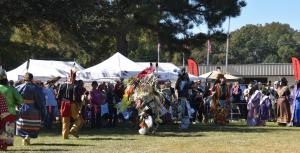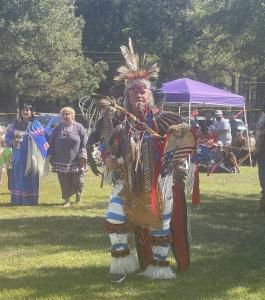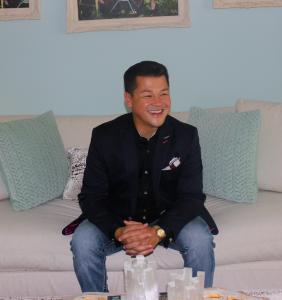Adai Caddo Indian Nation recognized as an Indigenous Tribe of Louisiana
The Louisiana Genealogical and Historical Society certifies the Adai Caddo Indian Nation as one of the indigenous tribes of Louisiana.
It is impossible to define Louisiana history without the Adai Caddo. From the first explorer to the first Spanish and French settlements, the Adai Caddo were there shaping the future of Louisiana.”
BATON ROUGE, LA, UNITED STATES, December 4, 2024 /EINPresswire.com/ -- The Adai Caddo Indian Nation is pleased to announce it has been recognized by the Louisiana Genealogical and Historical Society (LGHS) as one of the state’s indigenous tribes. As part of this recognition, the Adai Caddo Indian Nation was recorded in the official state registry of indigenous tribes in Baton Rouge. — Robert Brevelle, LGHS Chairman
“I am so thankful for this long-awaited accomplishment and recognition,” said Chief John Mark Davis of the Adai Caddo Indian Nation. “I am very proud of the culmination of work and research started by my father and beloved past Chief Rufus Davis and for his determination to promote the existence of our tribe. He fought the political, social, and legal battles to ensure the tribe’s recognition by the government. It is our responsibility to continue his work. On behalf of the tribe, thank you to the Louisiana Genealogical and Historical Society for this wonderful recognition.”
The Adai Caddo Indian Nation became a state-recognized tribe over 30 years ago with the passing of Louisiana Senate Concurrent Resolution No. 16. The Louisiana Senate asked the US Congress to federally recognize the tribe, but like many other tribes, their federal status continues to be tied up in the multi-year process at the US Bureau of Indian Affairs.
Prior to European contact, the Adai Caddo inhabited portions of central Louisiana and east Texas. The first European explorer of Louisiana was Álvar Núñez Cabeza de Vaca. He met the Adai Caddo in 1529, and wrote of them in his famous memoirs, La relación y comentarios. Cabeza’s accounts inspired other explorers such as Hernando de Soto.
The area remained uncolonized for nearly two centuries. The arrival of French explorers Pierre Le Moyne d’Iberville (the “Father of Louisiana”), Louis Juchereau de St. Denis (founder of Natchitoches) and Jean-Baptiste Bénard de la Harpe (founder of Fort Saint Louis de los Cadodaquious) began the colonization era for present-day Louisiana. These explorers documented their meetings, trade relations, and adventures with their new allies, the Adai Caddo.
The tribe’s involvement with the European colonial powers was so extensive, that the British, French, and Spanish originally named the Sabine River after the tribe (Rio de los Adiais), which is documented in the official records of the Treaty of Paris of 1763. Government records show the Adai Caddo remained allies of the colony, in particular with the strategic outpost of Fort St. Jean Baptiste des Natchitoches, throughout the colonial period which ended with the Louisiana Purchase of 1803. The fort became Natchitoches, the oldest town in Louisiana. The Adai Caddo are the founders of the first capital of Texas (present-day Robeline, LA) and the oldest town in Texas (Nacogdoches).
In the early years of the 18th century, European maps show the Adai Caddo’s territory going from the Red River by Natchitoches to the Trinity River in east Texas. The northern boundary was near Caddo Lake (home of the Petit Caddo) and to the south where the forest uplands meet the alluvial plains and costal marshes (home of the Atakapa). Within 100 years, their territory was reduced to small portions of present-day Natchitoches and Sabine Parish.
“We are pleased to certify and record the Adai Caddo Indian Nation as an indigenous tribe of Louisiana,” said Robert Brevelle, Chairman of the LGHS. “They are the first peoples of this land. They fed, sheltered, healed, and fought to protect the first European settlers ensuring the future of Louisiana. Their mestizo children are among the first colonial newborns and the first Creoles. The Adai Caddo are woven throughout the fabric of Louisiana history and genealogy. ”
The LGHS was founded in 1953 to collect, preserve, and publish genealogical and historical materials for the state of Louisiana and its people. The Society works closely with genealogy and ancestry libraries, historical societies, state agencies, research facilities and universities. LGHS is headquartered in Baton Rouge and sponsors a spring and fall seminar each year at the Louisiana State Archives building. The Society maintains three official state registries: First Families of Louisiana (families who settled within the present boundaries of the state prior to the Louisiana Purchase), Indigenous Tribes of Louisiana (Native American tribes residing in present-day Louisiana at the time of European contact), and Creoles of Louisiana (Creoles born in Louisiana during the colonial period and their descendants). For over 70 years, the Society has published The Louisiana Genealogical Register - an eclectic collection of Louisiana records as well as historical and genealogical articles. Over 100 libraries subscribe to this journal. Other publications include historical books such as Louisiana Soldiers in the War of 1812, Federal Census of 1810 for Territory of Orleans, A guide to Printed Sources for Genealogical and Historical Research in the Louisiana Parishes, Be it Known and Remembered: Bible Records (Volumes 1-5), and Early Louisiana Families.
The Adai Caddo Indian Nation of Louisiana is a state-recognized Native American tribe, member of the Native American Commission of the Louisiana Office of Indian Affairs, and oversees a 501(c)(3) nonprofit providing educational, emergency disaster and relief services, and other charitable programs to the historic Robeline and La Laguna de los Adaes (Spanish Lake) communities of Natchitoches Parish. This area represents the heart of the U.S. Census Bureau's Adai Caddo State Designated Tribal Statistical Area. The tribe operates a cultural center and museum which also serves as the regional emergency center. The 80-acre complex includes ceremonial grounds where the tribe hosts an annual powwow and other events. Visit us at www.adaination.com.
John Avery
Adai Caddo Indian Nation
email us here
Legal Disclaimer:
EIN Presswire provides this news content "as is" without warranty of any kind. We do not accept any responsibility or liability for the accuracy, content, images, videos, licenses, completeness, legality, or reliability of the information contained in this article. If you have any complaints or copyright issues related to this article, kindly contact the author above.



